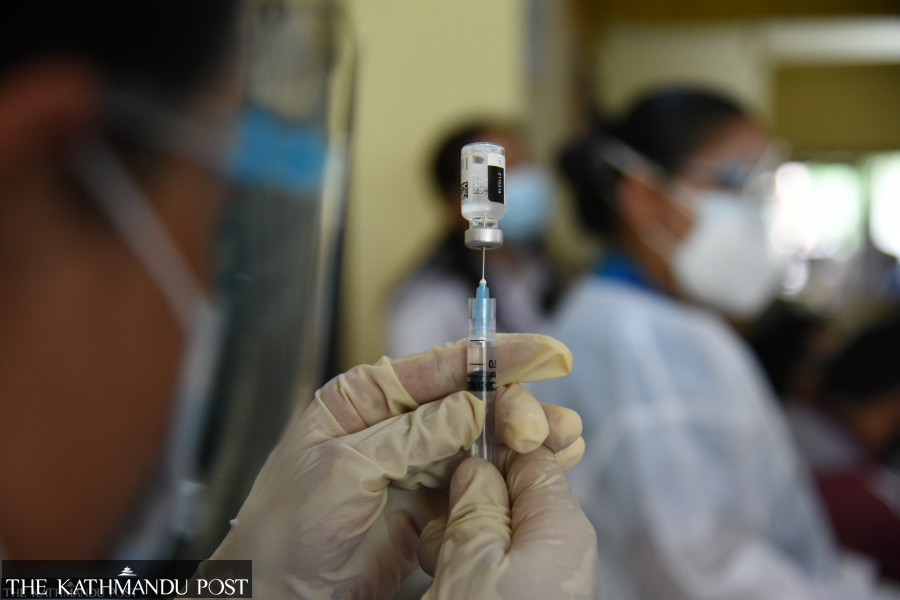Health
Over two-thirds population has Covid-19 antibodies, seroprevalence study shows
The coronavirus has reached far and wide, but information is not enough to draw any conclusion, experts say, as they stress ramping up tests and scaling up vaccination.
Shuvam Dhungana
Over two-thirds of the country’s population has developed antibodies to the coronavirus, according to a new study carried out by the Health Ministry.
According to a statement issued by the ministry, the seroprevalence study was conducted on 13,161 people, chosen randomly between July 5 and August 14. The samples were tested at the National Public Health Laboratory. The preliminary report says antibodies have been seen in 68.6 percent of the samples collected from across the country.
Dr Krishna Prasad Poudel, spokesperson for the Health Ministry, says the study suggests that the virus has already spread in a majority of the places of the country and that testing is still insufficient.
“What we need to understand is that the virus has spread to most parts of the country and that the risk remains,” said Poudel.
“But since the risk of the virus mutating continues, prevention and control of infections is the only effective way,” reads the statement. “That’s why there is a need to avoid crowds, maintain physical distance, wear masks and get out of the home only when necessary. One must take the vaccine as per their turns.”
Public health experts say unless a detailed report is available, it’s too early to decipher what the study means.
According to Dr Janak Koirala, an infectious diseases expert, antibodies have been seen in a majority of the population, but there is a need to look into one basic fact—whether they were developed because of vaccines or after getting infected with Covid-19.
“One thing is clear that we should not let our guard down,” said Dr Janak Koirala, an infectious disease expert. “Over two thirds of the population has been exposed to the virus during the first and second waves. The ongoing vaccination campaign may have reduced fears among people, but no one is safe until everyone is safe.”
No one knows, says Koirala, for how long the antibodies will work.
“We don’t know yet whether those with antibodies are immune to the virus,” Koirala told the Post.
The serology tests conducted among the said population look for either immunoglobulin M (IgM) or immunoglobulin G (IgG), the two antibodies to the coronavirus.
IgM is the first antibody developed by the immune system, and can be detected in the bloodstream within a week or two after infection or after a few weeks of vaccination, while IgG, is detected only after two weeks.
The Health Ministry has not revealed the details and methodology of the study.
Despite being one of the first countries to roll out vaccines, Nepal’s vaccination drive has remained sluggish due to its failure to secure enough doses.
According to the latest data of the Ministry of Health, 4,986,893 people, or 16.62 percent of Nepal’s 30 million population, have taken their first dose of Covid-19 vaccine, while 3,949,529, or 13.16 percent, have been fully vaccinated.
The number of cases may have come down, but the country is not out of the woods yet, experts say.
On Sunday, the Health Ministry reported 1,214 new Covid-19 cases from a total of 7,259 polymerase chain reaction tests. The positive rate continues to hover around 17 percent. An additional 174 people tested positive in 3,038 antigen tests.
The number of active cases stands at 35,796.
With 24 deaths reported on Sunday, the Covid-19 toll has reached 10,714 since the pandemic began in January last year.
Testing is key, but authorities have failed to expand the numbers. Though the government in May said it would conduct around 25,000 antigen tests a day, the number is less than 5,000.
With reports of vaccinated people getting infected, even though the severity is low, there are already concerns how the country is faring when it comes to fighting the virus.
And antibodies in a certain percentage of the population do not necessarily suggest the country has reached herd immunity, according to experts. A herd immunity is a situation when a large portion of the population becomes immune to a disease.
Dr Sher Bahadur Pun, a virologist and chief of the Clinical Research Unit at Sukraraj Tropical and Infectious Disease Hospital, says if antibodies have been produced naturally after a person gets infected with the virus, then it will remain in the body only for some months.
“After a certain time, the person could again be at risk of contracting the virus,” said Pun. “We don’t know yet whether the study is talking about antibodies found because of vaccines or because people had contracted the virus.”
According to Pun, the information available so far about the study does not show how many people got antibodies because of the virus or the vaccines.
“Until the full report is published, it would be wrong to talk about vaccine efficacy,” Pun told the Post. "Even vaccinated people are at risk and scientists do not know yet for how long antibodies remain in a person's body after getting vaccinated and for how long a vaccine can protect someone from the disease. The risk is still high.”
Both Pun and Koirala, however, encourage such studies.
“Such studies and data play a crucial role in making future strategies to control the disease,” said Koirala.
Pun said authorities should publish details about such studies so as to avoid confusion among experts and policy makers as well as the general public.
“The information given so far by the government on the study is too little to make any conclusion,” said Pun. “Such studies are important. But without details, it will be difficult to draw any conclusion.”




 11.84°C Kathmandu
11.84°C Kathmandu















